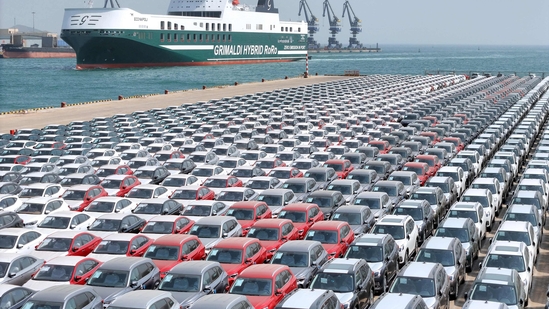In a sharp step that has the potential to change the dynamics of global trade, former US President Donald Trump’s suggestion of a 25% tariff on foreign cars is likely to impact a number of prominent Indian automotive firms. These include Tata Motors, Eicher Motors, Sona BLW, and Samvardhana Motherson, which have sizeable business exposure in the American market.

Effect on Tata Motors and Jaguar Land Rover
One of India’s leading automobile makers, Tata Motors, is likely to be hit badly through its holding company Jaguar Land Rover (JLR). About 22% of JLR’s overall sales come from the US, so it is also one of its most important territories. A tariff of 25% would contribute to a considerable hike in JLR vehicles in the US market, which would cut demand as well as lower profit margins. The firm can be compelled to change pricing models or venture into other markets in order to compensate for the fall.
Eicher Motors and Royal Enfield’s Export Issues
Eicher Motors, parent to the legendary Royal Enfield marque, might experience direct effects on its export volumes as well. Royal Enfield motorcycles have a sizeable and expanding customer base in the US, but higher tariff would increase their cost, which could reduce sales growth. Strategic changes like local production or price revisions would be on the cards for Eicher Motors to stay competitive.
Sona BLW and Samvardhana Motherson’s Global Exposure
Auto parts makers Sona BLW and Samvardhana Motherson will also likely be hit. Sona BLW provides critical parts to US-based automakers, and increased tariffs may result in cost increases, impacting demand. Samvardhana Motherson, with a diversified manufacturing platform in Europe and the US, might see rising production costs and supply chain problems. But its international presence may help cushion some of the downside.
Wider Implications for Indian Auto Sector
The suggested tariff is a manifestation of Trump’s protectionist policy to increase domestic production in the US. For Indian automobile manufacturers, the action highlights the susceptibility of export-oriented companies to geopolitical developments and trade policy fluctuations. Firms might have to seek alternative markets, diversify supply chains, or set up local manufacturing facilities in the US to offset the effect of increased tariffs.
Industry Response and Strategic Adjustments
Analysts feel that Indian auto companies would adjust by making more investments in domestic US factories or concentrating on hybrid and electrical vehicle manufacturing to capitalize on likely inducements in the US market. Cost-reduction and supply chain effectiveness focus will be vital in weathering the effects of these tariffs.
Trump’s tariff proposal makes life difficult for Indian auto companies that are based on US export dependence. However, strategic shifting and market diversification may also be able to soften long-term disruption and help maintain growth against a changing international trade landscape.



